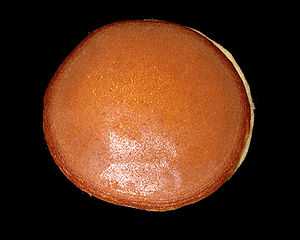Dorayaki
| Dorayaki | |
|---|---|
| Wagashi pancake | |
 | |
| Alternative name(s): | |
| Mikiosa | |
| Place of origin: | |
| Japan | |
| Main ingredient(s): | |
| Castella, red bean paste | |
| Recipes at Wikibooks: | |
|
| |
| Media at Wikimedia Commons: | |
|
|

Dorayaki (どら焼き, どらやき, 銅鑼焼き, ドラ焼き) is a type of Japanese confection, а red bean pancake which consists of two small pancake-like patties made from castella wrapped around a filling of sweet Azuki red bean paste.[1][2] Dorayaki are similar to Imagawayaki, but the latter are cooked with the batter completely surrounding the bean paste filling and often served hot.
Dorayaki originally only had one layer, and the current shape was invented in 1914 by Usagiya in the Ueno district of Tokyo.[3]
In Japanese, dora means "gong", and because of the simililarity of the shapes, this is probably the origin of the name of the sweet.[2][3] Legend has it that the first Dorayaki were made when a samurai named Benkei forgot his gong (dora) upon leaving a farmer’s home where he was hiding and the farmer subsequently used the gong to fry the pancakes, thus the name Dorayaki.[3]


Another name
In Kansai area, such as Osaka or Nara, this sweet is often called mikasa(三笠). The word originally means triple straw hat, but also an alternative name of Mount Wakakusa, a low hill with gentle slope located in Nara. Many local people picture the shape of this hill while eating a mikasa. In Nara, a larger mikasa of about 30 cm in diameter is famous.[4]
In popular culture
The Japanese manga and anime character Doraemon loves dorayaki, and it has been a plot device several times throughout the series. Doraemon is addicted to dorayaki and falls for any trap involving them. Since 2000, the company Bunmeido has been selling a limited version of dorayaki called Doraemon Dorayaki every year around March and September.
A popular Internet meme features a picture of Oolong the rabbit balancing a dorayaki on his head.
See also
- Japonesa - a similar confection eaten in Gibraltar
References
- ↑ "Dori-yaki: Bon Appetit!". NIPPONIA No. 40. Web Japan.
- ↑ 2.0 2.1 Yoshizuka, Setsuko. "Dorayaki". About.com Japanese Food. About.com. Retrieved 24 February 2012.
- ↑ 3.0 3.1 3.2 "Food to Try at HYPER JAPAN: Dorayaki". Gaijin Gourmet. Eat-Japan. Retrieved 24 February 2012.
- ↑ Blankestijn, Ad. "Monaka & Dorayaki". Japanese Food Dictionary. Retrieved 24 February 2012.